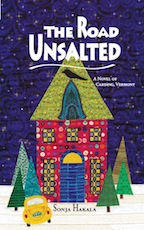 One of the greatest gifts in life is a good teacher. I have been fortunate to know several—my childhood art teacher, Maryann Davis, my fifth grade teacher, Paul Rocheleau, my photography teacher, Jim Block, and presently my friend, Sonja Hakala.
One of the greatest gifts in life is a good teacher. I have been fortunate to know several—my childhood art teacher, Maryann Davis, my fifth grade teacher, Paul Rocheleau, my photography teacher, Jim Block, and presently my friend, Sonja Hakala.
A fellow writer, Hakala is a self-publishing maven, who can take students through the history of publishing from its origins to present day. I feel like I am getting a Masters' level course, just sitting in her current class at the AVA Gallery in Hanover, NH.
Sonja has written books on publishing and quilting and recently turned her attention to fiction, writing a novel set in the fictional town of Carding, Vt.
Sonja gave me a copy of her novel for an unbiased review. I tried to be as unbiased as possible, and as a teacher myself used to reading students' works, I feel I did a good job, but t is always difficult to read the work of a friend—can she write, will I like it, what if I don't? Fortunately, Sonja can write and with every page I found myself being further drawn into the world of Carding, Vt., a town very familiar to my own.
And, for you dog lovers out there, Hakala includes a dog, Nearly that offers its own perspective on the community.
So, here is my review of Sonja's book. Next week I will run a Q & A with her. Enjoy!
Review: The Road Unsalted by Sonja Hakala
If you live in a small town, the dynamics of Sonja Hakala’s novel The Road Unsalted will be familiar to you. If you live in the Upper Valley of Vermont and New Hampshire, as I do, this story may feel like walking into a page of your own life. Hakala sets her tale in the fictional town of Carding, Vermont, but locates Carding in the Upper Valley region. Real life artists and locations pepper the story that has all the right elements including: small town politics, romance and scandal, and the warmth of family and friends found in such a tight-knit communities. At times I found myself laughing at the familiarity of it all, and at other times I was downright touched. Take for instance the scene where the friends of one of the main characters, Ted Owens, gather on the ski slopes to help him confront a painful memory. The characters ring true if a few, such as Lisa and Alli-O, are deliciously over the top. There are even a few scenes from the point of view of a dog, Nearly, a tribute to Hakala’s own dog Goldie. Nearly offers an unique perspective that dog lovers will enjoy. Hakala manages to use all these devices without seeming silly or diminishing the pace of the narrative. The novel is also peppered with lyrical description: “To the north of the green, the land swooped down to Half-Moon Lake, a big fat puddle that filled a hole craved out by the Corvus River. At the head of the lake, a thirty-foot bluff jutted out over the water, a great knobbly knee of granite that has resisted the river’s erosion for time out of mind.
The story has real heart as illustrated by the relationship between Suzanne and her Uncle Ted, but characters such as Edie Wolfe and her dog Nearly will long linger in my mind. The storyline – whether the Carding Academy of Traditional Arts will be forced to leave town as a result of a political debate over ancient roads – is entertaining, but it is the small town intrigue and wonderfully written characters that keep me reading and eager to return to Carding once again in the future.
